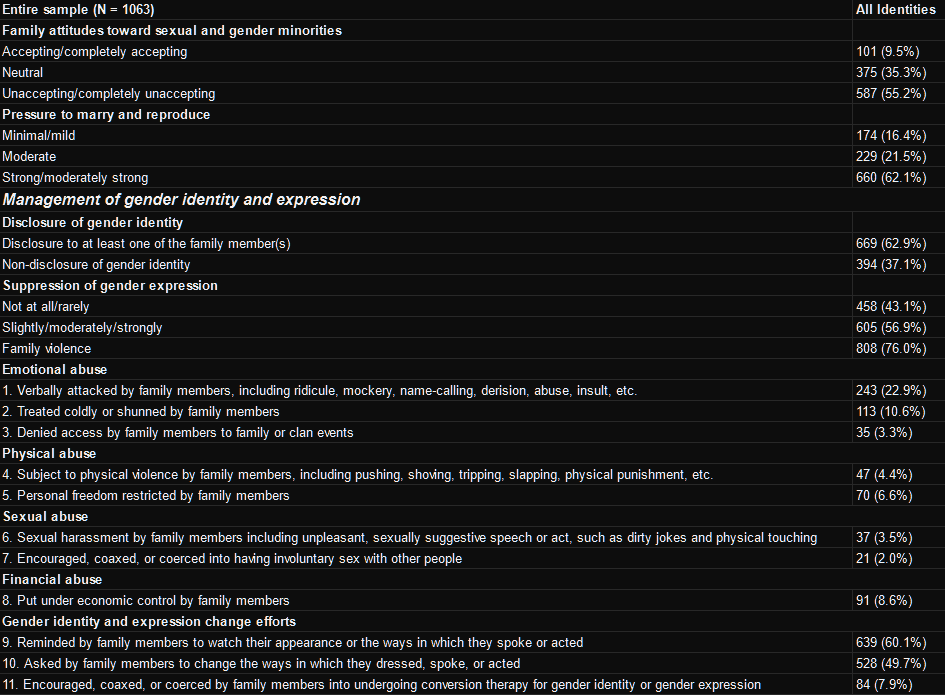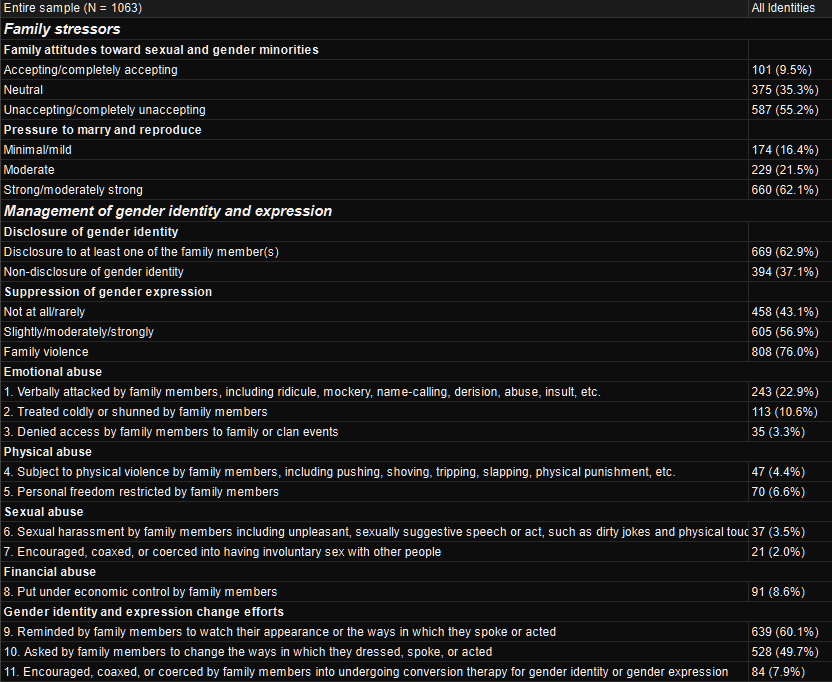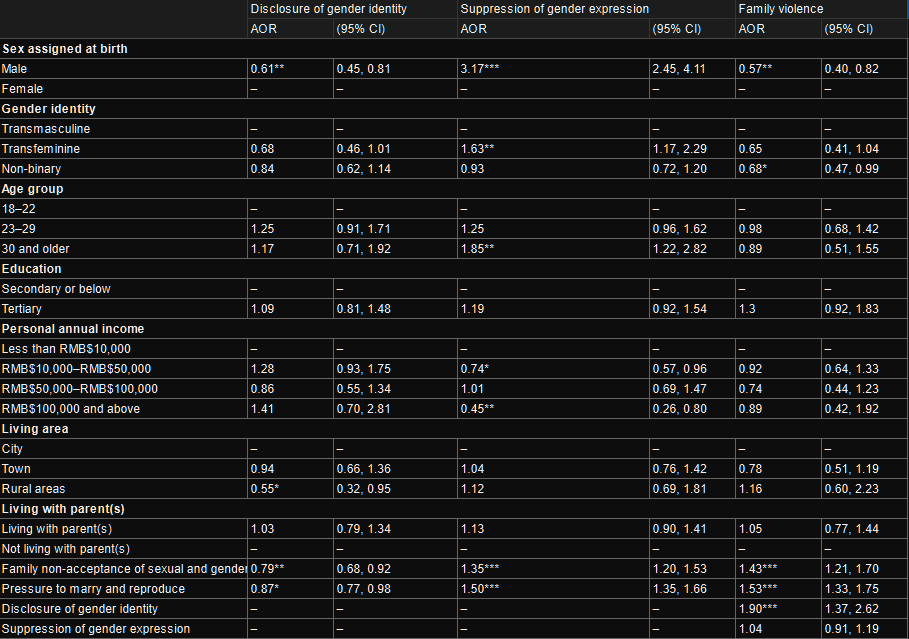CW: Discussion of transphobia, family violence
I'd like to point out that these rates seem unfortunately common across the globe, I would say these are fairly standard issues. I do like this paper, as they are very detailed and have clearly looked at western papers and filled in some gaps. I have edited the tables to only include the overall statistics to save space, but the paper does break things down by transfem, transmasc, and nonbinary, I wholly recommend viewing the whole thing.
TABLE 1. Demographic characteristics of the participants (N = 1063).

TABLE 2. Gender identity differences in family stressors, the management of gender identity and expression, and family violence.

TABLE 3. Association between family stressors, the management of gender identity and expression, and family violence.

Interpretation of Table 3:
Logistic regression was conducted to examine the associations of family stressors and the management of gender identity and expression with family violence. Family non-acceptance of sexual and gender minorities (AOR = 1.43, 95% CI = 1.21, 1.70) and family pressure to marry and reproduce (AOR = 1.53, 95% CI = 1.33, 1.75) were positively associated with higher levels of family violence. Moreover, disclosure of gender identity was positively associated with family violence (AOR = 1.90, 95% CI = 1.37, 2.62). Specifically, TNB individuals who disclosed their gender identity to their family members were 1.90 times more likely to experience family violence compared to those who did not disclose their gender identity. However, the association between gender expression suppression and family violence was not significant (AOR = 1.04, 95% CI = 0.91, 1.19). Furthermore, individuals assigned male at birth were less likely to experience family violence than those assigned female at birth (AOR = 0.57, 95% CI = 0.40, 0.82). Table 3 presents the regression of family stressors and the management of gender identity and expression on family violence.
Conclusion by authors:
While the family is often considered a shelter, our study reveals that for TNB individuals in China, it can unfortunately become an arena where rejection and victimization occur. The findings shed light on the harsh reality that TNB individuals face within their families, with a striking three-quarters of participants reporting experiences of family violence based on their gender identity and/or expression. These prevalence rates exceed those observed in Western contexts, highlighting the influence of rigid gender norms and family values on the familial experiences of TNB individuals in the Chinese context. Additionally, the study uncovers gender identity differences in experiences of family stressors and violence. The findings also establish a clear link between family stressors, the management of gender identity and expression, and the occurrence of family violence. Taken together, the results emphasize the pressing need for legal, institutional, and social measures to promote inclusive family violence prevention and responses for TNB individuals. There should also be a greater consideration of Chinese cultural factors when designing family violence interventions within health and social service settings.
I knew it was generally bad and that it was more common for TNB people to be rejected than embraced by their families, but I didn't know it was this bad. Seeing these numbers shreds my heart:
Family attitudes towards sexual and gender minorities: Accepting: 9.5% Neutral: 35.3% Unaccepting: 55.2%
how can it be that my husband and I are in this wildly tiny percentage of parents who love their kid just exactly the way they are and want to do everything to help them show their true, amazing self to the world
It is a testament to your incredible strength that any of my TNB comrades made it to adulthood. Jfc. I am so sorry.
Thank you for sharing this and condensing the findings. I think tables 1 and 2 are the same image? Seems the demographic table (1) is missing.
oh yep, guess i fucked that one up. too busy cuddling at this point to fix it

if you find it interesting i def recommend giving the full paper a read
What is up with this, don't we literally do this in "the West"?
Chinese culture, with its collectivist nature, places significant importance on the family as the basic unit of society (Chan & Huang, 2022)
Yeah, very bizarre passage. Some of the researchers are from Hong Kong. But they do have multi-generational households and clan-family structures, so I can understand some leeway on this.
they do have multi-generational households and clan-family structures
That's the main difference, but the "family focus" is honestly still a thing. The multi-generational thing is starting to come back due to the economy, though. I think you're right in this is what they mean.
the Chinese mind is different. For example they place a great emphasis on something called "face", and they go to great pains to "save face"--aka one's reputation--when being observed by 3rd parties.
now excuse me. I need to wig out and commit voluntary manslaughter because a bicyclist looked at me the wrong way
idk, my Asian family says something similar - that Western family bonds are quite weak and that's detrimental to society. I'm not Chinese but my Chinese friends have noted something like that, too. I don't think it's white people riffing.
Western family "bonds" aren't as close knit as they used to be since WW2, especially in angloid countries. It used to be much different.
yeah, but it's usually in reference to multigenerational families and the wider scopr of what's considered family. my second cousins were nominakly my brothers and sisters, for example.
(srry cant ser properky right now)
Just because it’s done somewhere else doesn’t mean you need to mention it if it’s not relevant lol. If the paper is about Chinese trans people then it makes sense why they’re trying to explain it in a Chinese context.
I don’t see how saying something like “ Chinese culture, with its collectivist nature, places significant importance on the family as the basic unit of society. Also western societies place a significant importance on the family.” is meaningful if the trans people in question do not live in the west.
I don’t see how saying something like “ Chinese culture, with its collectivist nature, places significant importance on the family as the basic unit of society
I didn't say it should be written like that, where did I imply that??? The way it's written is just odd for a paper like this, it sorta stands out.





